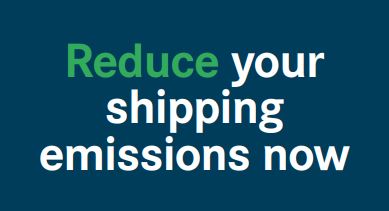
The Spliethoff Group aims to provide as comprehensive a service as possible. We believe that sustainability forms a vital part of this. Not only are we working hard to achieve our own sustainability targets, we are developing solutions that help you to lower your emissions, too. Spliethoff Group Green is a low carbon shipping solution that enables you to transport your cargo fossil free and with the amount of emissions reduction you require to achieve your reduction targets. Spliethoff Group Green even enables you to transport your cargo carbon neutral. . With Spliethoff Group Green, conventional fuel is substituted by sustainable bio-fuels, bringing your reduction targets into range.
With Spliethoff Group Green you can specify your desired reduction of CO₂e emissions. If it helps, we can support you in defining the reduction you require to meet your targets. Following this, we can determine how much biofuel you will need by applying emission factors as published in the Breakbulk GHG Emissions accounting and reporting guidance developed together with Smart Freight Centre (https://smartfreightcentre.org/). Within this standard, conventional heavy fuel oil, for example, has a TTW emission factor of 3.16 tonnes of CO₂e per tonne of fuel. Sustainable bio- fuels, on the other hand, have a factor of 0.On a Well to Wake (WTW) basis the emission factors are 3.76 for HFO and biofuels can go down to as low as 0.18 mt of CO2e per tonne of fuel depending on the feedstock.
Once we have determined the reduction goal, we will use the corresponding amount of biofuel onboard a Spliethoff Group vessel in the same calendar year or within six months of the agreement. Upon finalisation of the agreement, you will receive a certificate confirming the achievement of your emissions reduction target.
For Spliethoff Group Green we exclusively use biofuels that are ISCC or RSB certified. Additionally, the feedstocks for these fuels must be classified as renewable according to Annex 9 of the EU Renewable Energy Directive (2018/2001).
Of the biofuel forms available currently, HVO (hydrotreated vegetable oil) and FAME (fatty acid methyl esters) are the two most suitable alternatives to conventional fuels. In order to offer a reliable and cost effective solution, Spliethoff Group Green currently uses the widely available FAME biofuel or FAME derived biofuel. We foresee a wider range of options in the future as less conventional fuels such as other waste oils, bio-gas and bio-methanol become more widely available.
The process by which Spliethoff Group Green works is known as mass balancing. Put simply, the right of the Scope 3 emissions reduction resulting from the use of biofuel on our vessel, is transferred to you even when your cargo was aboard a different vessel within our fleet.
It is important to note the difference between mass balancing and offsetting. Offsetting typically refers to a reduction in another sector or value chain. Mass balancing, on the other hand, maintains the reduction in the same pool of assets -in this case within the same fleet, the Spliethoff Group fleet.
To reduce your emissions simply contact your commercial representative or send an e-mail to green@spliethoffgroup.com and ask for Spliethoff Group Green.
We look forward to helping you get started on your decarbonisation journey.